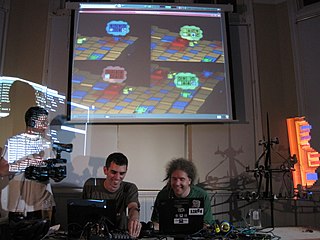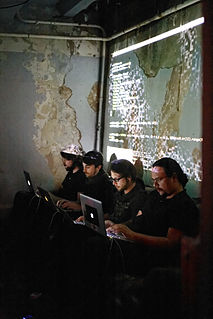Computer music is the application of computing technology in music composition, to help human composers create new music or to have computers independently create music, such as with algorithmic composition programs. It includes the theory and application of new and existing computer software technologies and basic aspects of music, such as sound synthesis, digital signal processing, sound design, sonic diffusion, acoustics, electrical engineering and psychoacoustics. The field of computer music can trace its roots back to the origins of electronic music, and the first experiments and innovations with electronic instruments at the turn of the 20th century.

PRS for Music Limited is a British music copyright collective, made up of two collection societies: the Mechanical-Copyright Protection Society (MCPS) and the Performing Right Society (PRS). It undertakes collective rights management for musical works on behalf of its 160,000 members. PRS for Music was formed in 1997 following the MCPS-PRS Alliance. In 2009, PRS and MCPS-PRS Alliance realigned their brands and became PRS for Music.
Laurie Spiegel is an American composer. She has worked at Bell Laboratories, in computer graphics, and is known primarily for her electronic-music compositions and her algorithmic composition software Music Mouse. She also plays the guitar and lute.

Trevelyan College is a college of Durham University, England. Founded in 1966, the college takes its name from social historian George Macaulay Trevelyan, Chancellor of the University from 1950 to 1957. Originally an all-female college, the college became fully mixed in 1992.

George Emanuel Lewis is an American composer, performer, and scholar of experimental music. He has been a member of the Association for the Advancement of Creative Musicians (AACM) since 1971, when he joined the organization at the age of 19. He is renowned for his work as an improvising trombonist and considered a pioneer of computer music, which he began pursuing in the late 1970s; in the 1980s he created Voyager, an improvising software he has used in interactive performances. Lewis's many honors include a MacArthur Fellowship and a Guggenheim Fellowship, and his book A Power Stronger Than Itself: The AACM and American Experimental Music received the American Book Award. Lewis is the Edwin H. Case Professor of American Music, Composition & Historical Musicology at Columbia University.
The Hub is an American "computer network music" ensemble formed in 1986 consisting of John Bischoff, Tim Perkis, Chris Brown, Scot Gresham-Lancaster, Mark Trayle and Phil Stone. "The Hub was the first live computer music band whose members were all composers, as well as designers and builders of their own hardware and software."

Live coding, sometimes referred to as on-the-fly programming, just in time programming and conversational programming, makes programming an integral part of the running program.

Impro-Visor is an educational tool for creating and playing a lead sheet, with a particular orientation toward representing jazz solos.
Gillian Rose Foulger is a British geologist and academic born in 1952 in Ipswich. Foulger plays a major role in coordinating the global debate in the category of Earth Science, on whether or not deep mantle thermal plumes exist and create “hot spot” volcanism.
Scott Wilson is a Canadian composer. He studied music and composition in Canada, the U.S., and Germany, and his teachers include Barry Truax, Wolfgang Rihm, Christos Hatzis, Gary Kulesha, Ron Kuivila, Alvin Lucier, Owen Underhill, Neely Bruce and David Gordon Duke. Since 2004 he has lived in Birmingham, UK, where he is Reader in Electronic Music and Director of Birmingham ElectroAcoustic Sound Theatre and the Electroacoustic Studios at the University of Birmingham.
Live electronic music is a form of music that can include traditional electronic sound-generating devices, modified electric musical instruments, hacked sound generating technologies, and computers. Initially the practice developed in reaction to sound-based composition for fixed media such as musique concrète, electronic music and early computer music. Musical improvisation often plays a large role in the performance of this music. The timbres of various sounds may be transformed extensively using devices such as amplifiers, filters, ring modulators and other forms of circuitry. Real-time generation and manipulation of audio using live coding is now commonplace.
Antoinette LaFarge is a new media artist and writer known for her work with mixed-reality performance and projects exploring the conjunction of visual art and fiction.

Slub is an algorave group formed in 2000 by Adrian Ward and Alex McLean, joined by Dave Griffiths in 2005 and Alexandra Cardenas in 2017. They are known for making their music exclusively from their own generative software, projecting their screens so their audience can see their handmade interfaces. Their music is improvised, and advertised as falling within the ambient gabba genre.

Benoît and the Mandelbrots, named after French American mathematician Benoît Mandelbrot, is a Computer Music band formed in 2009 in Karlsruhe, Germany. They are known for their live coded and Algorave performances, the Digital Arts practice of improvising with programming languages that gradually dissolves the distinction between composer and performer.

An algorave is an event where people dance to music generated from algorithms, often using live coding techniques. Alex McLean of Slub and Nick Collins coined the word "algorave" in 2011, and the first event under such a name was organised in London, UK. It has since become a movement, with algoraves taking place around the world.

Sonic Pi is a live coding environment based on Ruby, originally designed to support both computing and music lessons in schools, developed by Sam Aaron in the University of Cambridge Computer Laboratory in collaboration with Raspberry Pi Foundation.
Alexandra Cardenas is a Colombian composer and improviser now based in Berlin, who has followed a path from Western classical composition to improvisation and live electronics. Her recent work has included live coding performance, including performances at the forefront of the Algorave scene, she also co-organised a live coding community in Mexico City. At the 2014 Kurukshetra Festival Cardenas was a keynote speaker and hosted a music live coding workshop, the first of its kind in India. Cardenas has been invited to talk about and perform live coding at events such as the Berlin based Transmediale festival and the Ableton sponsored Loop symposium, and held residencies including at Tokyo Wonder Site in Japan and Centre for the Arts in Mexico City.

Ixi lang is a programming language for live coding musical expression. It is taught at diverse levels of musical education and used in Algorave performances. Like many other live coding languages, such TidalCycles, ixi lang is a domain-specific language that embraces simplicity and constraints in design.

Joanne Armitage is a composer, improviser and researcher based in Leeds, England, notable for her practice in live coded music, and research into haptics in music performance. She performs internationally using the SuperCollider language, including as half of live coding duo ALGOBABEZ with Shelly Knotts associated with the Algorave movement. Her music is often performed in a club setting, while embracing error and uncertainty. She is also known as advocate for diversity in music and technology, including through invited workshops. Armitage is a lecturer in Digital Media at the School of Media and Communication, University of Leeds, UK.
Antonio Roberts, is a new media artist and curator based in Birmingham UK, notable for his work in the areas of glitch art, installation art and live coding performance, including live visuals and/or music performances at algoraves. His work often addresses themes around open source software, free culture and copyright.











